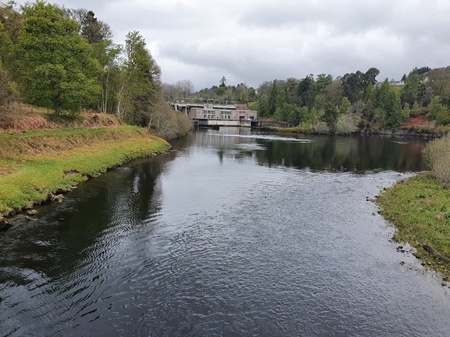“What are you going to do after your PhD?”
We face difficult questions in our research. There’s another difficult question—well for me anyway—was “what are you going to do afterwards?”. Maybe I found it hard because I’d given up a job for my PhD. And of course, Covid-19 certainly didn’t help as it meant restrictions on travelling, and like most people I definitely prefer face-to-face interviews. I was fortunate to be offered a post with SSE Renewables, working as a hydro environment advisor, whilst finishing up my PhD.
Powering the glens
There is a long history of generating energy from hydropower in Scotland. Schemes built in 1896 are still running today, and many of the major river systems have been harnessed to provide electricity. After the Second World War, a large-scale construction programme was initiated. Reservoirs were created and tunnels constructed to store and divert water to newly built power stations that brought renewable, green and socially-just hydroelectric power to much of highland Scotland, including the remote villages and glens.
Mitigating for salmon
But the hydro schemes were not without controversy. Dams impede migratory fish passages and many of the river systems were renowned for their salmon fishing. There were also important commercial salmon fisheries near the river mouths. So, when the schemes were built, fish lifts and ladders were incorporated to help the adult salmon return to their breeding grounds. However, less thought was given to the young salmon. Each spring, large numbers of young salmon, known as smolts, head out to sea where they feed and grow rapidly. However, they too find it difficult to migrate past dams as they can’t find the exit points of the fish lifts and ladders, so mitigation is also required for them. One way this can be done is by trapping them upstream of the dam, transporting and releasing them below the dam, so that they can continue their journey to sea. As a hydro environment advisor, much of my time is spent ensuring that mitigation for fish passages is effective. We make sure the smolts are able get out to sea, that the adults can return, and the water is managed effectively at the right time to facilitate their movements.
What have I learnt?
There are a lot of interesting jobs out there that may be different from what you initially set out to do. I am still able to use my newfound statistical skills to evaluate data and reports, such as those from consultants and PhD projects we support. We need to use influencing skills as some people don’t like to change their minds, but the critical thinking skills we learn ourselves as scientists are really important—we look at the facts and are readily prepared to change our own minds based on the evidence. So, don’t stop learning and “what are you going to do afterwards” needn’t be so daunting!



A great story and I love the personal reflection- have a great weekend
Thanks Naveed, very inspiring!
Thanks for sharing Naveed! Helps to reflect as my last year is ahead..
As there are, for all practical purposes, almost no smolts leaving English rivers which would return as the part of a spring run, this fact results in more pressure upon Scottish Smolt numbers. As these come largely from the headwaters of large East Coast rivers and some northern rivers. As HEP scheme impoundments and catchment diversions are concentrated in these headwaters, the former abundance of smolts sourced naturally from impounded areas is decimated. In turn, natural rivers like the Dee, North Esk, Thurso, Naver now provide the bulk of this springer cohort so this group are left to face all the risks of marine life.